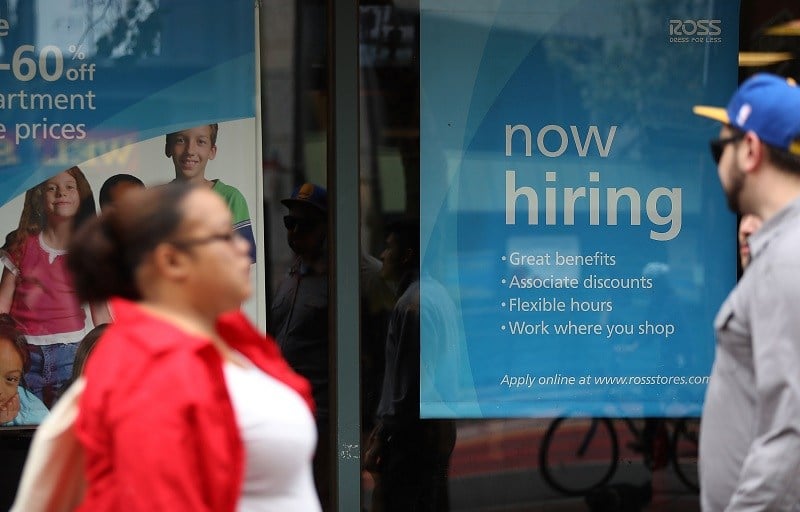
A businessman walks along Wall Street in front of the New York Stock Exchange | Spencer Platt/Getty Images
It’s that mental health aspect that we often overlook, however. Obviously, losing your job will have a huge impact on your finances. You’ll have to take stock of your resources and plan accordingly. But losing your job, or simply having a hard time finding a new one, can be much more taxing than we realize. It shakes your confidence and makes you second-guess yourself. After an extended period of time, it can really gnaw at you — and even lead to depression or anxiety issues.
In short, your employment status (or lack thereof) can be destructive to your mental health, not just your personal finances. A new study, published in the journal Social Science & Medicine, all but confirms it. And it’s something that we should take into consideration as our economy continues to evolve.
It’s all about employment status

A ‘now hiring’ sign is posted outside of a store, advertising opportunities for employment | Justin Sullivan/Getty Images
By looking at “well-being gradients” for given social or working classes (managerial, semi-skilled, unskilled, etc.), the researchers found that employment status is often an overlooked part of the equation. Simply having a job is much more important to our psychological well-being and mental health than we’ve previously realized. Well-being and social class have typically been explained through a number of traditional channels, and this new research basically says that there is another that’s been ignored.
“We noticed that employment status is forgotten in many studies of well-being gradients,” the authors write, in a follow-up piece published by The Conversation. “Yet employment status is associated with far larger differences in well-being than class.”
Mental health and status

Feeling alone | iStock.com
“Does this mean that class does not matter? Have sociologists been barking up the wrong tree all these years by talking about social class? We shouldn’t be too hasty,” the authors write. “We have seen that social class is a key factor in determining access to the labour market, which has clear implications for psychological health. But the real culprit, as we’ve demonstrated, is employment status.”
That last bit is the important part: Having a job — any job — is extremely important to our mental health and well-being.
Interestingly enough, this is also something that’s been recently tied to divorce rates. Employment status can make or break a marriage, according to Harvard researchers, and that likely has a lot to do with some of the psychological and mental health factors discussed by the Oxford team.
How to cope with job search anxiety

Stressed worker | iStock.com
Psychologist James Pann says when faced with a stressful situation, our body goes into overdrive. We immediately enter into “panic mode,” and our body prepares to fight or run away from a perceived threat. Consequently, we may start to sweat, get the shakes, and feel our heart pounding before and during a job interview. Pann said:
When it is comes to networking, interviewing, and other stressful job search events, many of us experience at least some of these signs and symptoms. When faced with significant physical or psychological stress, your body reacts with what is termed the “fight or flight response.” The response prepares your body for physical action through sympathetic nervous system arousal and an increased release of corticoids, which are stress hormones. Virtually all the systems in your body are affected, including the circulatory, pulmonary, immune, and nervous systems. The physical symptoms associated with this state include quickened and shallow breathing, stomach disturbance, muscle tension and increased pulse rate.
Visualize what could go right when looking for a job

The future is so bright you need shades | Thinkstock
“By visualizing yourself as calm, using creative visualization techniques to relax, you can remove nagging anxiety, lower your blood pressure and overcome fears and phobias … If you’re lacking in self-belief and, for example, feel incapable of passing exams or overcoming obstacles in your life, you can call on creative visualization to strengthen your self-image and your belief in yourself. As you grow, you’ll naturally achieve the things you previously thought were impossible,” said author Robin Nixon.
No comments:
Post a Comment